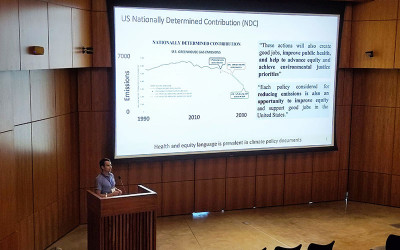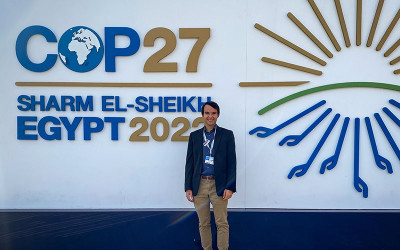Originally from Davis, Calif., fifth-year PhD student Pascal Polonik is studying climate science at Scripps Institution of Oceanography at UC San Diego. Prior to graduate school at Scripps, Polonik received bachelor’s degrees in environmental science and in atmospheric science at UC Berkeley. He also received a master’s degree in meteorology at Ludwig Maximilian University of Munich. He is currently doing research on human-environment interactions in the labs of climate scientist Kate Ricke and environmental scientist Jennifer Burney.
explorations now (en): Why did you choose to attend Scripps?
Pascal Polonik (PP): I liked doing research in atmospheric science, but I wanted to work more directly on the impacts of and solutions to climate change. I get to do interdisciplinary work at Scripps because my advisors specialize in bridging earth science and public policy. Both the students and the faculty I interact with are also really kind and supportive, and it's important to me to enjoy the time I spend with the people I see every day.
en: What are you researching at Scripps?
PP: Very broadly I'm researching human-environment interactions. My most recent project is about how air pollution in the United States might change with climate policy. Since unhealthy air pollutants, like particulate matter, are emitted when we burn fossil fuels, implementing climate policy will improve air quality. Since air pollution disproportionately impacts people of color, we want to know whether climate policy could improve air quality equity. I have also studied how atmospheric particulates impact climate and health, analyzed air quality equity in California using the COVID-19 shutdown as a natural experiment, and explored how imperfect global temperature and precipitation measurements influence our understanding of global climate impacts.
en: How did you become interested in science and your field of study?

PP: I initially studied environmental science because I cared about the environment and liked the idea of learning a little bit of everything, including biology, chemistry, physics, math, economics, etc. I became interested in the physics of climate change, which drew me towards atmospheric science. But I wanted to incorporate humans into my understanding of environmental problems more directly, so I moved toward policy-relevant atmospheric science for my PhD. My interest in environmental equity gradually grew with my growing understanding of existing inequities, but my interest was accelerated by my participation in an interdisciplinary and collaborative project during the COVID-19 shutdown.
en: What’s life like as a Scripps student? Describe a typical day.
PP: I often run in the morning and then bike to Scripps, which takes about 20 minutes. Most of the day then consists of computer-based research, which usually means coding in Python, a high-level programming language. I often have lunch with other graduate students on a balcony with great ocean views. In-person or Zoom meetings and seminars are also commonly scattered throughout the day. I also usually chat with my office mates for a while to see what they're up to so I'm not just alone at my computer. Depending on the time of year, I might go outside to watch the sunset or play some beach soccer before biking home.
en: What’s the most exciting thing about your work (in the field or in the lab)?
PP: I think the most exciting thing about my work is its relevance to real-world problems. In addition to learning about how to build a more sustainable and equitable future by reading academic papers and conducting my own research, I also try to follow the public debate on environmental problems because they can lead to policy change that is relevant to my work. I also get to learn about all the interesting research being studied by my peers, spanning from geoengineering and cloud physics to internal ocean waves and ocean mixing. It's fun for me to keep learning about a wide variety of topics that I would not be exposed to elsewhere.

en: Are there any role models or mentors who have helped you along the way?
PP: Yes! I've been incredibly lucky to work with wonderful people, some of whom might barely remember working with me but still had a big impact on my career. I'm not sure I would still be doing research if it wasn't for the enthusiasm and support of the people I worked with when starting my research and my advisors at Scripps. Most of them have been incredibly patient early-career scientists who taught me practical skills and treated everyone around them with kindness and respect.
en: What are some of the challenges you face as a student?
PP: Balance. Although this isn't really reflected in my description of a typical day, lots of time goes to activities beyond the data analysis required for my research. That includes things like committees, seminars, conferences, teaching, and writing; not to mention all the normal life things like exercise and socializing. For me, striking a balance has required constant adjustment, but I think that might be more a reflection of modern expectations than of graduate student life specifically.
en: What are your plans post-Scripps?
PP: That remains to be seen! I like the work that I do, and I hope to find a job at a university that lets me continue to do research. Working for a government agency, NGO, or national lab are all possibilities. I often refer to my future career decision as a multi-dimensional optimization problem, by which I mean that these decisions are based on many different factors —professional and otherwise — that have to be weighed against each other.
You can find Polonik on Twitter @PascalPolonik and on Instagram @ppolonik.